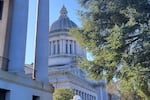It was a short week for many people across the state, but not for Washington lawmakers.

The Washington Legislative Building on Feb. 23, 2024.
Jeanie Lindsay / NW News Network
They were busy dealing with budget proposals in Olympia, as they are looking to adjust the state's current two-year spending plan while they stare down the final stretch of this year's legislative session.
The main budget proposals in the House and Senate put forward increases of more than $2 billion. That includes new spending on key priorities, pay raises for government workers and inflation adjustments, and the deployment of funding from opioid lawsuit settlements and the state's carbon emissions auctions.
In the operating budget proposals, K-12 schools and behavioral health loom large — with major new spending targeted for special education and addiction treatment facilities. Both the Senate and House proposals include around $140 million for Olympic Heritage Behavioral Health, a psychiatric facility in Tukwila.
Lawmakers also laid out plans to spend more money raised by the Climate Commitment Act — specifically from the carbon emissions auctions that allow companies to buy pollution allowances. The program, however, is on uncertain ground due to a voter initiative that could lead to its repeal.
Democrats have linked funding for several projects to the continuation of the CCA.
For example, House and Senate Democrats have proposed $200 utility credits for low- and moderate-income households funded through the climate law. Under the House plan, half of the credit would go out this fall with the next half distributed in early 2025. If the climate law is repealed, the second payments won’t happen.
While the budget proposals in the House and Senate have a lot in common, the Legislature will ultimately pass one final version of each of the three budgets — operating, transportation and capital construction – before the session is over.
Initiative hearings
Lawmakers also revealed more information this week about how they will handle hearings on three voter initiatives.
A total of six initiatives qualified for the ballot. Three of them — repealing key parts of the state’s Climate Commitment Act, repealing the capital gains tax, and making the WA Cares long-term health care payroll tax optional – will head directly to voters in November.
Next week, joint committees of House and Senate lawmakers will hold hearings on the remaining three:
- I-2111, prohibiting income taxes, will be heard Tuesday, Feb. 27, at 12:30 p.m.
- I-2081, creating a so-called “Parents’ Bill of Rights” will be heard Wednesday at 8 a.m.
- I-2113, rolling back limits on police car chases, at 9 a.m.
Democrats say the purpose of the hearings is to learn more about what impact the measures would have on the state and to gauge whether the initiatives could be enacted by the Legislature as is. Lawmakers could also propose alternative options, which would appear on voters’ ballots in the fall alongside the original initiative proposals.
Policy updates
Elsewhere in Olympia, dozens of policies are still up in the air, while others have been unceremoniously left behind.
The hotly debated rent stabilization bill, House Bill 2114, got a hearing on Thursday before the Senate Ways and Means Committee. The bill was routed around the Senate Housing Committee, which killed a similar version of the bill earlier this session. The House bill has to be voted out of committee Monday to keep moving forward.
Another cutoff deadline this week meant the demise of more bills, including:
- Senate Bill 6298 which would have made clergy members mandatory reporters of child abuse and neglect. It's the second year in a row the bill has died. Disagreements over whether the reporting requirement should apply to information obtained through confession have proved to be a crucial sticking point.
- House Bill 2001, which would have given judges authority to review the cases of people serving long prison sentences and possibly shorten them if those individuals prove they've been rehabilitated.
But there are plenty of bills still being considered, like:
- Senate Bill 5444, which would add zoos, libraries and bus stops to the list of places where it is illegal to openly carry a firearm.
- Senate Bill 5838, to create an artificial intelligence task force.
- House Bill 2112, requiring opioid and fentanyl education and overdose medication at colleges and universities, as well as Senate Bill 5804, requiring K-12 schools to carry at least one set of overdose reversal medication, like Narcan.
It’s also the point in the session where more bills are nearing final passage. The Senate approved House Bill 1241 Thursday, which would make in-person threats made against election workers a class C felony — which could mean up to five years in prison and thousands of dollars in fines. The bill’s sponsor, Rep. Mari Leavitt (D-University Place) expects the bill to be on its way to the governor’s desk in the coming days.
The Senate also passed House Bill 2331, which would prohibit schools from banning books because they are written by or about people from marginalized groups.
House lawmakers plan to hit the floor Saturday to keep passing bills. The legislative session is slated to end March 7.